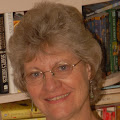There are several different types: For example I was the editor of the Women Writing the West catalog for three years. Basically what I did, was to organize all the information and prepare it for the designer and printer. I didn’t do much, if any, changing of the copy that came in from the authors.
When working on someone’s manuscript, you have basically two types of editing involved: line editing (copy editing) and conceptual (or substantive) editing.
Line editing: making changes on a sentence-to-sentence level. Taking a look at grammar, style, sentence structure, typos, punctuation. (I can hardly read a manuscript without marking commas)
Conceptual editing looks at the overall book to see what's missing, what scenes can be intensified, and what sort of story-level changes could be made to strengthen a work.
Making a work better and stronger isn't just about fixing the things that don't work - it's about strengthening the best parts as well. My job as editor is to think along with you, the writer, and help make your writing more effective.
A few things for writers to remember:
The better you are, the more criticism you’re likely to get. If your work sucks, it doesn't take a lot of detail to tell you so. On the other hand, if you're a terrific writer there may be lots of subtle improvements you're capable of pulling off.
If lots of people don't get what you're doing, it's you. If one person doesn't understand what you're trying to pull off, then maybe it's that person, but if you get the same criticism repeatedly, then you're not getting your point across. If you have to explain the joke before people get it, it's not funny.
Don't make corrections blindly. If you really feel that the editor doesn't get what you're trying to do, don't jump in and make all the corrections anyway. Even when writer and editor are on the same page, you'll probably only make about 50% of the editor's suggestions. (Although you'll address all of them, accomplishing some in different ways and deciding that others don't actually help.)
Often the purpose of conceptual edits is to make you think about how a scene works and point out ways to make it stronger; it doesn't mean you won't find a better way to address those weaknesses than the ones I suggest. Just approach them with an open mind.
My favorite quote is from Ernest Hemingway: “There are no great writers, only great re-writers.”
---------------------------------------
 A native Montanan, Heidi Thomas now lives in Northwest Washington. She has just had her first novel published, Cowgirl Dreams, based on her grandmother. Heidi has a degree in journalism, a certificate in fiction writing and is a member of Northwest Independent Editors Guild. She teaches writing and edits, and is working on the next books in her “Dare to Dream” series, and blogs.
A native Montanan, Heidi Thomas now lives in Northwest Washington. She has just had her first novel published, Cowgirl Dreams, based on her grandmother. Heidi has a degree in journalism, a certificate in fiction writing and is a member of Northwest Independent Editors Guild. She teaches writing and edits, and is working on the next books in her “Dare to Dream” series, and blogs.

I like conceptual editors. They make me see aspects of my manuscript in a different light. It's a great way to enhance and broaden what came out of my mind.
ReplyDeleteMorgan Mandel
http://morganmandel.blogspot.com
http://twitter.com/morganmandel
Often, while editing, I mark a sentence, passage, scene or paragraph with a comment that it doesn't work for me and why, and then suggest they make a change. It's a joy when the author sends me back the piece or the full manuscript and I see they have taken what I said and made it so much better - better than the original, sometimes exactly what I was thinking and, oftentimes, nothing like what I would have done.
ReplyDeleteHelen
http://straightfromhel.blogspot.com
Good points Heidi about taking the editor's suggestions and making a scene better. I really appreciate that in the editors I have worked with on my books.
ReplyDeleteAnd when I am editing for a client, I will do much like Helen said, mark a section and offer a suggestion. I tell them that it is just an example of how they could improve the writing and often that stimulates something even better from them.
I am a conceptual editor (and an author & ghostwriter who uses conceptual editors for my own work), and I had never come across that Hemingway quote before. I love it! I'm sure I will use it when working with my writers. Thanks.
ReplyDelete